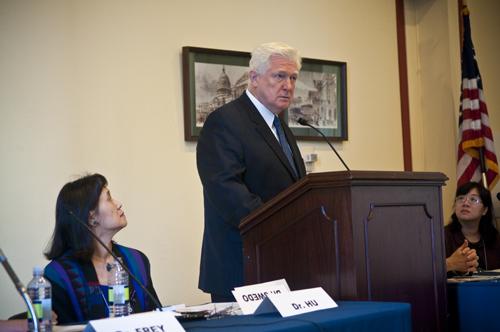
Correction appended
This post was written by Hatchet reporter Charlie Hamilton.
Lawmakers praised GW’s pledge to become the first D.C. university with an autism research center Wednesday on Capitol Hill.
Six GW researchers spoke about plans for the University’s autism research center and described their latest research successes to members of the Congressional Autism Caucus, as part of the University’s Autism and Neurodevelopmental Disorders Day.
Rep. Jim Moran, D-Va., a member of the autism caucus, said he would try to rally Congress to help fund the $10 million needed for the center. Moran said a D.C.-based center would help fuel autism-related legislation.
“[Autism] is one of the very most important health and education issues facing our country today,” Moran said. “We do need to really attack what’s really a crisis by researching the causes of autism.”
GW made autism a major research focus in 2010, when Vice President for Research Leo Chalupa announced a University-wide initiative to study the neurodevelopmental disorder.
Chalupa’s office is knee deep in fundraising for the center. GW brought in a development officer for the project in February, who is courting donors from private foundations across the country.
Valerie Hu, a biochemistry professor, said the institute would be a game-changer in D.C.
“I’m a parent of a now 25-year-old son with autism,” Hu said. “There’s no comprehensive institute in the Washington, D.C. area that can help parents and children through this maze.”
Chalupa said GW is focused not only in studying the causes of the development disorder, but also how to integrate autistic children into a traditional public system and how to train special education teachers.
The special education department in the Graduate School of Education and Human Development offers a new 15-credit certificate program for future teachers to learn best practices for educating children with autism. Most panelists agreed that one of the biggest problems in autism awareness today is the lack of instructional understanding in the teaching community.
“What we hope to do is learn how we can work with families and put into place the most effective systems of learning,” said Donna Behrens, associate director for the GW’s Center for Health & Healthcare in Schools. “Our job is to help those with an [autism and neurodevelopmental disorder] and their families.”
This post was updated Sept. 19, 2012 at 10:25 p.m. to reflect the following:
The Hatchet incorrectly reported the name of Valerie Hu as Valerie Chu. We regret this error.




